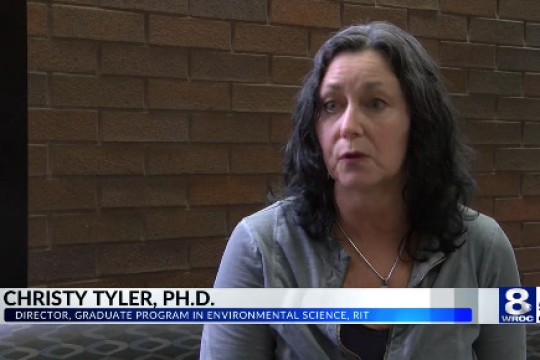RIT Industrial Engineering Program Wins Innovations in Curriculum Award
Team wins national award for incorporating sustainability-themed curriculum in engineering and resulting growth in new degree programs
The Rochester Institute of Technology industrial and systems engineering program won the 2009 Innovations in Curriculum Award from the Institute of Industrial Engineers at the organization’s annual conference in June. This is the first time RIT has been recognized for the award that is given to a college or university engineering program that integrates creative instruction with relevant topics to meet the changing needs of the industrial engineering profession.
The RIT program was awarded for the Integration of Sustainable Engineering into the Industrial Engineering Curriculum. Faculty members Andres Carrano and Brian Thorn shared the honors. Their entry described how sustainability initiatives were incorporated into the degree program and the growth of the program over a six-year period resulting in new courses, undergraduate minors, new senior design projects and two new graduate degree programs as well as an increase in student participation.
“We believe that the role of engineering education must be transformed to address critical issues throughout the curriculum and across disciplines. One of the most dramatic dimensions of change in today’s manufacturing milieu is the recognition of the demands that the production and consumption cycle place on the planet and its people, and the recognition of the role that product and process designers play in reducing these environmental and social impacts,” says Thorn, associate professor in the Department of Industrial and Systems Engineering in RIT’s Kate Gleason College of Engineering.
“This has been a grassroots effort driven by the students and faculty,” says Jacqueline Mozrall, department head of the industrial and systems engineering department. “The student demand for the curricula has been overwhelming, with over 400 students engaged in these courses and applied project work over the last several years. These efforts are positioning our future engineers to apply sustainability-related knowledge and principles and make an impact in this area. I congratulate the faculty for working cooperatively across disciplines to make this happen.”
The work was partially funded by the United States Environmental Protection Agency and was a result of several cross-disciplinary teams’ contributions including Harvey Palmer, dean of the Kate Gleason College of Engineering; Marcos Esterman, assistant professor, Industrial and Systems Engineering; Edward Hensel, Robert Stevens and Margaret Bailey, faculty members in the mechanical engineering department; James Winebrake chair of the public policy department in the College of Liberal Arts, and Maureen Valentine, associate dean and faculty member in the civil and environmental engineering technology in the RIT College of Applied Science and Technology.














